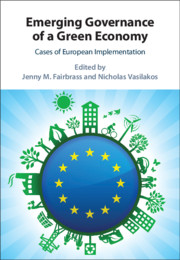Book contents
- Emerging Governance of a Green Economy
- Emerging Governance of a Green Economy
- Copyright page
- Contents
- Figures and Tables
- Contributors
- Preface
- Book Synopsis
- Acknowledgements
- Abbreviations
- 1 The Green Economy
- 2 The Green Economy
- 3 The Green Economy as Good Governance
- 4 On the Verge of a Second Revolution in the European Union’s Utilities Market for Energy Production?
- 5 ‘Great Expectations’
- 6 Overcoming Structural Disadvantages with Local Green Economies?
- 7 Shifting Models of Energy Companies towards Green Economy in Europe
- 8 Carbon Calculation and the Urban Green Economic Opportunity
- 9 The Green Economy
- Index
- References
5 - ‘Great Expectations’
The Green Economy Discourse and Practice in Romania
Published online by Cambridge University Press: 20 January 2021
- Emerging Governance of a Green Economy
- Emerging Governance of a Green Economy
- Copyright page
- Contents
- Figures and Tables
- Contributors
- Preface
- Book Synopsis
- Acknowledgements
- Abbreviations
- 1 The Green Economy
- 2 The Green Economy
- 3 The Green Economy as Good Governance
- 4 On the Verge of a Second Revolution in the European Union’s Utilities Market for Energy Production?
- 5 ‘Great Expectations’
- 6 Overcoming Structural Disadvantages with Local Green Economies?
- 7 Shifting Models of Energy Companies towards Green Economy in Europe
- 8 Carbon Calculation and the Urban Green Economic Opportunity
- 9 The Green Economy
- Index
- References
Summary
This chapter looks at the extent to which the green economy agenda is nothing more than ‘business as usual’ focused on growth and investment in the case of an unlikely green state. Romania had limited credentials with regard to ambitious environmental policy and a difficult transition to market economy and democracy. However, Romania has surprisingly experienced the emergence of a green economy discourse separate from sustainable development and a range of green economy initiatives in niche sectors and across different levels of government, with a peak of activity in 2016-2017. The chapter links this to the agenda of a technocratic caretaker Government, as well as the emergence of subnational actors from the environmental movement and local and regional level, that was able to successfully engage in green economy initiatives, bypassing the national government level. Using the example of the renewable energy sector, this chapter shows that significant growth in this area usually associated with the green economy, does not necessarily ensure either sustained or green practices.
- Type
- Chapter
- Information
- Emerging Governance of a Green EconomyCases of European Implementation, pp. 74 - 89Publisher: Cambridge University PressPrint publication year: 2021

